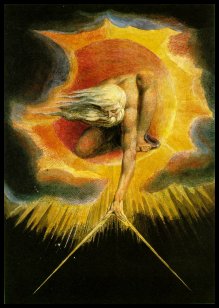





For the Medieval mind, the Cosmos was centered
on the Earth, between Heaven and Hell.
This world-picture was overthrown by the Copernican Revolution.
Religion and Politics
I grew up believing that religion, and particularly Christianity, is the greatest threat to reason, liberty, and civilization. People like me find it difficult to understand and accept the fact that religious conservatives believe that they, not we, are defending liberty and civilization; and it is equally difficult for them to believe the same of us.
Unfortunately, neither side's suspicion of the other is entirely groundless. The schools are the most obvious battleground, where each side tries to impose its will on the other: religious conservatives to put in religion and drive out evolution, the secular Left to drive out religion and put in relativism and egalitarianism.
There's no room for equivocation here: science is right, religion is wrong. In particular, theists who try to refute evolution are banging their heads against reality. If you reject Darwin, you might as well reject Copernicus; and there are probably others who think the Earth is flat. But the secular Left hates Christianity more than it loves reason and science. In driving out one old familiar superstition, it lets in a host of new superstitions.
All religions are equally false, but they are not equally pernicious. Christianity is an old, established, conservative religion, woven into the fabric of the Western world. If reason and science are threatened by Christianity, they are threatened even more by academic "postmodernism," "New Age" mysticism, neo-paganism, ecological pantheism, etc., which all radically reject Western civilization as a whole.
In terms of personal hygiene, grooming, dress, manners and morals, religious conservatives are far more pleasant to have around than the adherents of these new superstitions. This is not a trivial matter, though it may seem so at first glance. The fundamental issue in politics is this: what kind of society, what kind of people, are we to be?
Militant, irrational atheism brings with it the temptation to reject morality as such, along with religious morality. For those who succumb to this temptation, every "thou shalt not" is answered with "why not?"
The rejection of morality has two pernicious social consequences: on the part of militant, irrational atheists, a tendency to advocate communism, or anarchism, or both; and on the part of traditionally religious people, a tendency to believe that all atheists are militant, immoral communists and/or anarchists. Atheist that I am, I am as firmly devoted to moral and social order, and opposed to any form of communism or anarchism, as any religious conservative could be. Any political conflict between "secular humanists" and Christians is totally unnecessary, and is only due to ignorance, folly and malice on either side.
© 1999 by Karl Jahn
Further Reading